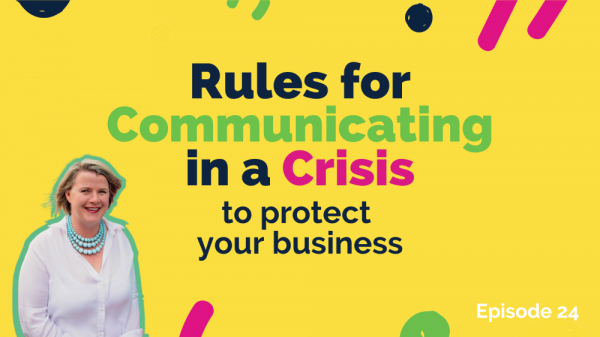Things go wrong in businesses every single day, whether it be crime, lockdowns, natural disasters, employee issues, or worse. You have insurance to help you during these times, but have you ever considered that your insurance isn’t going to protect your reputation and credibility, therefore leaving your future revenue and recovery vulnerable?
Preparing NOW for how you’ll communicate both internally and externally during a crisis situation is what will make all the difference.
Learn the best crisis communication strategies to prepare and implement when a crisis hits your business, that I’ve used over the past 25+ years.
A crisis, even a small one, can end up costing your business through lost sales, lost clients and staff, compensation, and of course, reputation damage. Just one poorly handled crisis can undo all of your hard work and take you months or even years to recover from.
In this episode you’ll learn:
- The most important crisis communication strategies to help you take control in a crisis, protect your reputation and income, and recover faster
- How to effectively communicate during a crisis with your employees, customers and stakeholders
Share the Love
If you love what you’ve heard, please share this podcast with your friends, family, and colleagues. Support the show by taking some time to leave a review at https://ReviewThisPodcast.com/SSOMPodcastW.
Thanks! And a big thank you to Mini Sandcrabs for their wonderful review:
“I loved every minute of the episodes I listened to. So many “ah ha” moments. A must for any small business!”
Podcast Transcript: Crisis Communication Strategies
Hello and thank you for joining me on the Simply Standout Marketing Podcast. I’m so excited that you’re here with me today because crisis communication is one area that is forgotten by most small and medium businesses, yet it can have the biggest effect.
I learned this the hard way back in my first job out of uni, when a major crisis hit the organisation I was working for and in no way were they prepared to handle it. So we had a serious situation which was made so much harder because there was nothing in place to deal with any type of crisis.
There was no plan in place to guide me with what we were supposed to do, the steps we needed to take to protect the organisation, reduce the damage this situation caused and ensure a quick recovery. So I did what anyone does in the same situation, I used the knowledge I had and winged it. Nothing like being fresh out of uni and in charge of communicating in a major crisis. Was it stressful? Absolutely. I’d often come home from work and cry. Could it have been handled better? It definitely could have but we did the best job possible with what we knew and with the resources we had at the time.
What did I do differently from that day forward? I developed crisis communication plans for businesses I worked for and consulted for – sometimes simple for businesses with lower risk, and sometimes very detailed plans for businesses with higher risk factors where the damage could be far reaching. And yes many of these plans have been put into action.
So let’s get onto talking crisis communication strategies that you can implement into your business.
The aim with all of your communication, whether it be an email to staff, a phone call with a customer, or a social media post, is to give your staff and customers peace of mind and confidence in your business, maintain brand awareness, engagement, and encourage sales. Effective crisis communication is key to keeping your customers and your valued staff. So what are the essential components to effective crisis communication no matter what size your business or what industry you’re in? Here are my top tips.
The rules for communicating in any crisis are: Be prepared… communicate frequently… keep to the facts… and respond quickly.
The first strategy you need to implement is “be prepared”. Back in episode 18 <LINK TO EPISODE> of the podcast we talked about the three stages of crisis communication – plan, respond and recover. I’d recommend you go and listen to that episode to give you a better understanding of how to prepare and put together a simple and actionable crisis communication plan, so that when something goes wrong in your business, which inevitably they will at some stage, you’ll be ready and able to protect your business.
The next step is communicate frequently. When something goes wrong in your business and it affects others, this is the time when you need to be communicating more, not less. The situation, no matter what it is, tends to change rapidly, so you must communicate with your employees, customers and stakeholders frequently. Keep your communication simple and in bite-sized chunks, as information overload is a real thing. Consider the changing fears and concerns of your people and communicate to allay those fears. They need to know that you’ve got a plan and that their health, safety, job security, and product or service fulfilment is important to you.
One thing that’s important to remember is to always communicate internally first. Your employees are always top of the list because they need to know before anyone else, what’s going on. They are the ones on the frontline talking to customers, suppliers and stakeholders, so they must always be the first to know about any decisions or changes. They’re also your biggest advocates, so you need to make sure they’re on-board with what you’re communicating.
Strategy three is another important one – always keep to the facts. You’d be surprised how easily it is to add in an opinion or two into communication you create without even being aware of it. Your job here is not to pass personal comment on whatever the situation might be, as everyone has their own perceived view of what is reality. Your job is to stick to the facts. Now if you’re thinking that all sounds very cold and calculated, that is definitely not the case and should be the opposite of what your communication should be. I’m not talking unicorns and rainbows here, because that’s the last thing people want in a crisis. But you can easily stick to the facts while expressing empathy and compassion.
Now another thing to consider in your communication is that you’re going to be making a lot of decisions, and communicating those decisions will form an important part of your strategy. In doing so, remember to always provide the basic reasoning behind the decision that you’re communicating, so as not to cause further fear, mistrust, or misunderstanding. An example might be… say you run a retail store and there was a fire in the store room. You’d want to send out an email to your customers, plus have info on your website and front door saying the basic facts of what happened, how this affects them and what you’re doing to ensure continuity of service, plus you might say something alongs the lines of “to ensure the health and safety of our customers and staff we will be closed until 9am on Monday. All current orders will be delivered via express post at no added cost” You’d also thank them for their continued support and let them know how they can contact you. Always think about how this affects your customers.
When it comes to a broader scale crisis that affects more than just your business like a natural disaster or pandemic, don’t ever assume that the large amount of information out there relieves you of your duty to communicate directly with your clients and stakeholders by providing factual information and empathy as it relates to your business. There’s always so much misinformation that circulates during big crises, and so much media hype that you should never assume anything.
The fourth essential strategy you need to use during a crisis is to respond quickly. Whether it’s phoning your staff, emailing your clients and suppliers, or putting out a media statement, you need to act fast in order to reduce misinformation, build trust, reduce the damage to your business, and make it easier to recover. In crisis communication, there is a thing we like to call “the golden hour”. This is the first hour after a crisis occurs when it’s crucial that you need to get preliminary information out about the situation. This could be quickly getting information out to your staff, clients, media, and government bodies. It’s all about getting on the front foot and having control of the situation rather than the situation having control over you. Remember how quickly information spreads these days via social media and text messages. It takes nothing for thousands of people to be misinformed in minutes and then you having to go into damage control.
So remember, the rules for communicating in any crisis: Be prepared… communicate frequently… keep to the facts… and respond quickly. A little pre-planning can go a long way to protecting your reputation and your business so make sure you set aside a few hours to develop a plan that uses these strategies. Remember to go and listen to episode 18 of the podcast if you haven’t already, which guides you through how to put together a basic crisis communication plan. A crisis, even a small one, can end up costing your business in lost sales, lost clients and staff, compensation, and of course, reputation damage. Just one poorly handled crisis can undo all of your hard work and take you months and even years to recover from. Just like you have insurance to protect your business, I hope you understand how important it is to have a crisis communication plan to protect your business so you can get through anything that the world throws at you.
Thanks so much for listening. If you love what you’ve just heard, please share this podcast with your friends, family, and colleagues.
The Simply Standout Marketing Podcast is designed to help small business owners and entrepreneurs stand out and grow their businesses. Because growing their business will change their life.




